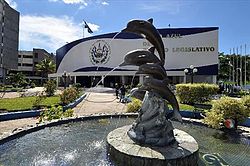Lawmakers in El Salvador are responding to what some are calling an attempted coup against the legislature. This is in response to President Nayib Bukele’s decision to call an atypical weekend session of Parliament, then entering the chambers accompanied by a group of heavily armed soldiers and police officers (Fernandez et al: 2020). This act has drawn widespread criticism in El Salvador, with critics pointing to El Salvador’s history of authoritarianism and civil war as a result, in part, of military involvement in politics (Brigida: 2020). Bukele’s message to the legislature was clear, reportedly saying as he entered the chambers “it is clear who is in control of the situation” (BBC: 2020). Critics and political opponents are denouncing Bukele’s actions as an attempted coup. Even if such accusations are somewhat exaggerated, it is nonetheless a troubling violation of democratic norms.
Hostility between Bukele and Parliament stems from a $109 million proposed loan from the Central American Bank for Economic Integration. The loan was intended to finance the third phase of Bukele’s security plan for the country, with the money being spent on things like helicopters, drones, security camera, and bullet-proof vests (BBC: 2020). While the proposal was generally supported by lawmakers, many wanted more details about how the money would be spent, delaying the process. This delay prompted an angry backlash from Bukele, who accused the legislature of being corrupt and in the pocket of the country’s gangs (BBC: 2020). Bukele called for an abnormal weekend session of the assembly to expedite the loan’s approval, a call many members of parliament ignored in protest of what they believed to be executive overreach (BBC: 2020). It was in this Sunday session that Bukele entered with his armed entourage entered, presumably as encouragement to pass the necessary legislation.
While the seriousness of Bukele’s actions in the past days has been unprecedented, the actions themselves are not uncharacteristic of the young and highly popular Salvadorian President. Bukele, just 38 years old, ran for and won the presidency largely on a promise to reduce the endemic crime and violence in El Salvador, which had one of the world’s highest murder rates. Since he took office in May of 2019, the average number of daily killings has dropped from 9.2 to 3.8 (Fernandez et al: 2020). Bukele and his supports attribute this drop to his so-called Territorial Control Plan, for which the funds in question were intended. These results in a country that has been so plagued by violent crime has earned Bukele great popular support, with approval ratings approaching 90% (Brigida: 2020). As a result, many Salvadorians are willing to support Bukele despite the democratic concerns.
The implications of Bukele’s posturing are highly troubling for anyone interested in the democratic health of El Salvador. Though labeling his actions as a coup may be hyperbolic, the blatant disregard for democratic norms is nonetheless problematic. Not only was it an aggressive use of executive influence, the threat of military involvement in legislative issues undermines a core tenet of democracy. The tacit threat of military force as a means to achieve legislative goals circumvents all standard procedures of the legislative process. It is particularly concerning in a country and region whose not-too-distant history is marred by repressive military rule. The conflict between Bukele and legislators is likely to continue for the foreseeable future, as Bukele has promised to push out lawmakers in El Salvador’s next election cycle (Brigida: 2020).
While the event itself is concerning, what may be even more so is the mixed public response. While Bukele has drawn criticism from many public figures, he retains a substantial amount of public support. Supporters cite his effectiveness in cracking down on crime and gangs in the country and his tough stance on corruption in the government (Brigida: 2020). In a country where violence is a genuine threat for many, it’s understandable that a solution to it is more important to those people than abstract ideas about democratic procedure, a sentiment Bukele has echoed. This, however, creates a problem for democracy in the country. If Bukele is willing to resort to undemocratic measures, as this incident would suggest, and citizens are unwilling to hold him accountable because they support the cause for which he is fighting, democratic norms may be further eroded. Bukele has even teased the prospect of dissolving the legislature (Brigada: 2020), though he has refrained from doing so thus far.
Ultimately, the root issue is the level of distrust among
Salvadorians and other citizens of Latina America in democracy. Satisfaction
with democracy dropped to just 24% in Latin America (Brigada: 2020), allowing
leaders like Bukele to circumvent democratic practices when pursuing policies
related to citizens’ actual priorities: security and corruption. It seems clear
that for democracy to thrive, governments in Latin America must improve their
standing with citizens and bolster their legitimacy. This poses a challenging
question, however. Is this best done by addressing citizens concerns as proof
of performance or by strengthening the quality of elections and other
institutions to restore citizens’ faith in the democratic process?
Works Cited
Brigada, Anna-Catherine and Sheridan, Mary Beth. “Showdown in El Salvador Shows Growing Role of Military in Latin American Democracies.” Feb 11, 2020. The Washington Post. https://www.washingtonpost.com/world/the_americas/leaders-in-el-salvador-and-across-latin-america-leaning-on-the-military-to-assert-power/2020/02/11/d1265418-4c22-11ea-967b-e074d302c7d4_story.html
Fernandez, Daniel Silva; Delcid, Merlin; Ehlinger, Maija; McGee, Luke. “Armed Police and Troops Storm El Salvador’s Parliament.” Feb 10, 2020. CNN. https://www.cnn.com/2020/02/10/americas/el-salvador-armed-police-storm-parliament-intl/index.html
“El Salvador Parliament Denounces President’s ‘Attempted Coup.’” Feb 11, 2020. BBC. https://www.bbc.com/news/world-latin-america-51458947

